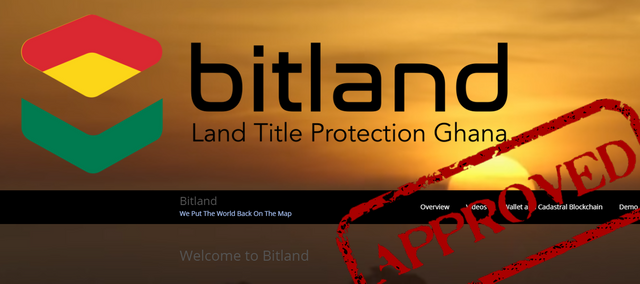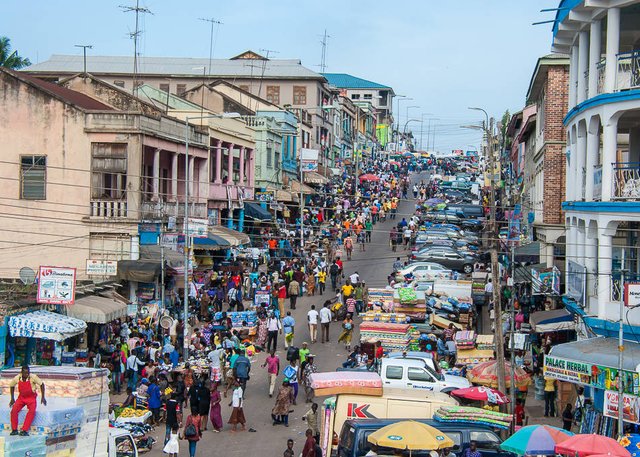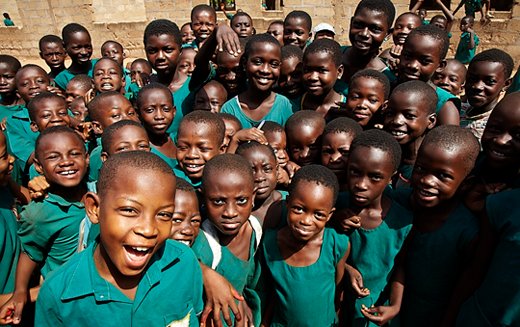The Bitland Project is set to Empower Ghana Through Land Title Registration - Corporate License Approved!

The Graphene Powered Bitland project has acquired a commercial license to operate a blockchain company in Nigeria to facilitate the operation of land title registries backed by the Bitshares blockchain.
A little more than 12 hours ago Bryce Weiner the Blockchain Architect for Bitland mentioned in a live interview with Blocktalk's Alex Sterk that the Bitland Project has officially been granted permission from the Ghanaian government to establish their land title registration project in the country of Ghana.
Bryce (Blockchain Architect for Bitland): "The Bitland project is land registries in Africa they actually have the approval from Ghanaian government to do all of the land registries for the country of Ghana. In fact as of this week Bitland has been awarded the very first corporate license to operate a block chain company in the country of Nigeria specifically for the building of a land registry for that country; we actually have the official documentation, we were granted our corporate status last week."
Interview is below and relevant quote is at 15:59
Please note this video is on the topic of a new project named 'TAO', the only mention of Bitland is at 15:59 when they get off topic
What is the Bitland Project?

Bitland is an effort to create a blockchain-based land registry in Ghana. In many countries around the world, land ownership is poorly recorded and poorly enforced, denying land owners a crucial asset they could sell, borrow against, or legally develop. An immutable registry could create a market where once there was none.
Bitland’s first market will be a pilot project in Ghana through an NGO Bitland Ghana. Following a successful pilot, Bitland will expand to other countries in Africa and elsewhere
Bitland is an experimental platform using decentralized, trustless models to bridge the gap between the government and the undocumented areas.
Its key principle is that all participation is voluntary. Meaning that there’s a personal and/or community consent, and approval, time-stamped, and government approved.
This process will be tokenized in the blockchain for later reference, for every claim, and transaction.
Why Ghana?
Bitland's Christopher Bates has said in a recent interview Adam B Levine on the LTB network that Ghana has been targeted as the first implantation due to the benefit to the people and the current system and that it is a great testing ground for the project as it will present the largest set of barriers to entry.
This attack the hardest problem first methodology will ensure that future roll-outs of the projects have ease of implementation due to the lessons learnt whilst in Ghana.
Within the interview in relation to why start with Ghana Chris stated: "If we can figure out how to fight corruption in the most corrupt places then when we move into the least corrupt places we wont be enabling more corruption where there is not as much"
Specifically, the project is being piloted with 28 communities in Kumasi, a city in southern Ghana that is among the largest metropolitan areas of the country, with the intention of expanding it across the African continent.

Another problem being worked on by Bitland in Ghana is the lack of reliable infrastructure and access to basic blockchain related dependencies such as Electricity and Internet for all. This is being delivered via Physical Solar powered Bitland Centres throughout Ghana. Work on the very first Bitland center in progress at the moment.
The team has developed a four year implementation plan that looks to start with a local WiFi network for the pilot communities, then establish metropolitan access networks which would give greater Ghana constant access to the Bitland network.
What is the broader goal - How does it changes lives in Ghana?

The transparency provided by the blockchain and the visibility of titles is a foundation that can lead to increase foreign investment in these areas, facilitating growth of infrastructure and services to these communities.
Allowing this money to flow into these economies will facilitate mortgages or loans which were not possible before given the current state of the title system and to corruption in the area. This increased productivity will lead to increased production of good and services which will have a ripple effect and ultimately increase the quality of life for individuals and for the community as a whole.
How does Bitshares play into all this and what is CADASTRAL?
Bitland has issued the CADASTRAL token on the Bitshares blockchain to represent the Bitland Network. The digital token will be the entry token to utilize the Bitland application to register land titles, settle disputes, sell land, purchase property, and issue microloans for commercial development.
The CADASTRAL token is available on the Bitshares Decentralized Exchange and will be used as an entry token to the Bitland land title transaction chain. This allow's Bitland to harness the power, flexibility and ease of access to the underlying Bitshares network and focus their energy on providing the platform and partnerships without having to worry about the security of their token or incentivising miners to secure their own chain.
As the Bitland team develops the ecosystem, individuals who have obtained CADASTRALS will be able to use them to invest in the local economy and see real returns on their investment, as the team is establishing a system which will allow smart bonds and smart contracts to be created and utilized by governments, communities, organizations, and individuals.

Information relating to the CADASTRAL token can be found on CryptoFresh or in the Bitland Whitepaper and can be traded via the Bitshares Decentralised Exchange either via the Bitshares Lite Client or Openledger Web UI
Bitland and Bitshares - Changing the world :)

Further Information
Bitland Official Website
Bitland Whitepaper
LTB Interview
CADASTRAL Token
This a good project but the video interview in this post has practically nothing to do with it. Please be more clear that the interview is unrelated except when they got far off topic and Bryce mentioned Bitland very briefly. Thanks.
Appreciate the comment and i completely understand where you are coming from; if you are only interested in Bitland the full interview is not relevant.
I have made an update to be clear on the fact.
Bryce is working with us at Bitland and is a very important part of establishing the large scale infrastructure. There are a LOT of things he can't talk about with what we are doing, which is why he only spoke briefly.
Cheers!
Chris
CSO Bitland Global
I fully understand that. You're missing the point of my comment.
No. I'm not missing the point of your comment.
Chris
I can´t wait to see more from Bitland. This is a great initiative.
What a great initiative! The people of Ghana deserve this. I hope it is very successful and helps the economy and infrastructure in the region.
In Kenya, Mpesa the phone payment provider doesn't allow bitcoin to compete within it's markets, so the enthusiasts needed to find another solution to how to modernize the people there. This might succeed.
We are actually going to make Kenya part of our Nigerian pilot, as Kenya has such a tradition of crowdfunding and such a tech savvy population, it is a natural connection to reach out to Kenya. Stay tuned :)
Chris
CSO Bitland Global
You're doing gods work. The work that you're doing there is may change the course of an entire nation, maybe even entire continent. Since you mentioned crowdfunding, the main question is are you profitable in the long run? As in you don't just spend the investors money away then turn to another crowdfunding.
Thank you very much for the kind words :)
To quickly address your question, the local entities will always be NGOs to protect the locals' interests. If we don't have local NGOs, it could enable a wave of neo-colonialism. What our system will do will prevent foreign "ownership" of property, but only investment and return on investment. Many of the development issues in countries like Ghana have come from foreign investment being non-existent due to lack of government oversight. The Bitland infrastructure will always work with a government to ensure that the transactions are legal, and by proxy of using blockchain technology transparent and uncorruptable.
You can read the white paper here:
http://www.bitland.world/wp-content/uploads/2016/03/Bitland_Whitepaper.pdf
Cheers!
Chris
CSO Bitland Global
I really wish for this to work for the people of Ghana and the whole region. Bryce said many important things other than the Bitland Project. I hope you guys watched the whole video.
Great project! Real -world use cases like this can foster a blockchain, decentralized mentality across the world.
"Imagine there's no country..." :)
Yaaaaaaay! I'm from Ghana and proud to hear this :)
wow! Finally I see crypto changing the world of people in need. I really hope that less people will starve and get what they deserve. We are equal human. The skin colour should be no reason for discrimination. Makes me happy to see the world changing
I support this project. It will bring real security of land title in many African countries
Interesting to me- I do business in Ghana, specifically in Tema. My client is a commercial land developer. We provide electrical infrastructure components to him.
I witnessed a land purchase last year- basically a handful of cash was handed to a tribal patriarch to buy a tract of land near their village. It seemed very sketchy to me, but apparently this is the way it's done, and the land records are recorded with the government in a totally separate process with completely different people.
I also understand that the ownership of land reverts after... what, 50 years, if I remember correctly.
Sounds like you have an interesting project here.
Yes, you are spot on! There are many people who double, triple, and quadruple sell land to multiple people, and the patriarchs get all the money. As well, land is often taken from widows who should rightfully own the land, but the patriarchs take it and give it to their male family members.
As well, the years for land tenure are 50 and 99, so no land can be owned "indefinitely".
This is why we are trying to consolidate the stool/skin ownership with the actual government records. If you are interested, please contact us at [email protected].
Cheers!
Chris
CSO Bitland Global